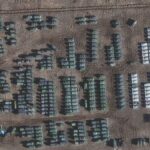A mixture of military and economic measures will serve as an effective measure to prevent Russia imposing its vision on Ukraine. The policy should be subtle and swift, while the alternative risks bringing greater projection of Russian power.
It is clear that Ukraine is back on Russia’s agenda. Military moves near Ukraine’s eastern border have made many believe that Russia is about to invade Ukraine. This could be true or turn out to be a complete fallacy – either way Moscow has used these measures to manipulate the West, frighten Kyiv and extort additional benefits. Some have also suggested that Russia would abstain from military actions if rewarded properly – for instance, through the federalization of Ukraine. The problem with this understanding is that it misses a larger picture, where Russia has set the scene for greater pressure against Ukraine. Vladimir Putin and Dmitry Medvedev penned pieces where an overall approach to Ukraine is presented: Ukraine cannot act independently and essentially exist without Russia’s approval. There is also a sense of urgency in Russia’s actions. All factors point to the conclusion that even if the Kremlin is provided with meaningful concessions, in the longer run, Moscow is unlikely to reduce pressure on its Western neighbor. The demanded federalization will be used as a pretext for, if not dismantling Ukraine, certainly weakening it to the level of near complete inner inefficiency.
A much wider context is also important. Moscow is seeing a window of opportunity. Global shifts where a multipolar world order is on the rise and where the U.S. is increasingly centered on China presents the Kremlin with significant room for maneuver. If there is a potential China-Russia cooperation the collective West should be most worried about, it is Beijing and Moscow aligning their policies around Taiwan and Ukraine. Pressure on one front is likely to serve as a catalyst for tensions in another. Potential coordination could be deadly as the U.S. will be unable to contain the two powers simultaneously.
Ways to Diffuse Tensions
An all-out U.S. military commitment to Ukraine is considered risky and unlikely unless Washington does see Ukraine as a part of its defense perimeter. Echoing this thinking, Joe Biden’s recent statements have indicated that Ukraine would not be seeing American troops on the ground even if Russia invades.
What could be helpful then is a more nuanced policy. An effective deterrent should be based on what the U.S. pursues elsewhere in Eurasia. Washington could realistically help build a web of partnerships between the Black Sea states and potentially, perhaps, Poland to help Ukraine. The U.S. could act as an external anchor. It does this with AUKUS and the Quad, and is likely to increasingly rely upon allies and partners rather than direct military involvement. It would still require a considerable U.S. commitment, but it would nevertheless be smaller than what defending Ukraine unilaterally would involve.
The policy of deterring Russia should consist of several pillars. One of them is encouraging Turkey-Ukraine military and political cooperation. This in itself means Washington should be intent on improving its faltering ties with Ankara. It would give a freer access to the US military in the wider Black Sea region. Encouraging Turkey-Ukraine military cooperation with some elements of US involvement can be a cornerstone for building capabilities serving as blockage against Russia. The policy could be especially effective since Turkey and Ukraine have already entered a fruitful cooperation. The Turkish company Baykar Defense will build a plant for the production of Bayraktar TB2 drones in Ukraine. The cooperation also involves constructing a center for their testing, maintenance, and personnel training.
It could be more troublesome for Russia if Turkey and Ukraine decide to work on advancing naval cooperation as both loath Russian moves which overturned the balance of power in the Black Sea following the annexation of Crimea in 2014.
Though considered unrealistic several months ago, Turkey could indeed play a vital role in making Russia see graver military consequences in case a major military move is made by Russia. Indeed, as the recent use of Turkish drones in eastern Ukraine against Russian military technologies showed, Moscow fears seeing Turkish technologies used near its borders.
Yet ultimately without a certain U.S. military support it would be impossible to deter Russia. Ideally some sort of gradual increase of military cooperation with Ukraine should take place. This might not be as large as causing outright fears in Moscow about a prompt change in the balance of power. But rather a phased policy should be implemented where consistency will play a major role in gradually changing the military situation on the ground.
The U.S. could consider sending lightweight Stingers, air defense systems, or the Iron Dome defense system. Washington could also think about sending the military equipment which was initially earmarked for Afghanistan. But perhaps consistent efforts in providing training to Ukrainian forces is what matters most in the potential conflict in the plains of eastern Ukraine.
Yet even the suggested military measures and the creation of regional grouping might not be enough. The West should be utilizing a powerful economic tool too. The threat of imposing harsher sanctions on Russia is a powerful mean for limiting or even altogether deterring the Russian military moves.
Russia plays a long game around Ukraine and the West, and the U.S. in particular should be doing the same. Changing the military balance on the ground overnight in favor of Ukraine is both daunting and extremely risky. But a mixture of economic, low- to mid-level military measures and diplomatic support will make significant changes in the longer term. This is what Russia fears most, and the West should be playing this card.
Image Source: Eurasia Review

